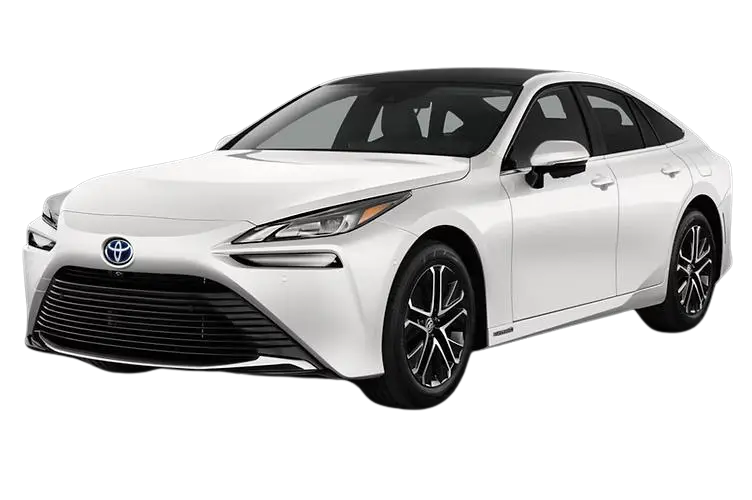PROBLEMS WITH YOUR HYDROGEN CAR?
has your
Hydrogen Car
let you down?
Join other hydrogen owners in seeking justice.
If your car has defects or issues with
filling stations, you deserve compensation.
Let's fight together.
has your
Toyota Mirai
Let You Down?
Let's fight together.

What's Wrong With Hydrogen Cars?
Hydrogen owners have been reporting many problems such as drivetrain issues, electrical failures, and hydrogen system leaks. These problems can cause reduced vehicle performance, unexpected breakdowns, and frequent refueling difficulties.
The issues compromise the reliability and safety of the vehicle, leading to increased frustration among owners.
Hydrogen Car Lawsuit Attorney
In 2014, hydrogen fuel cell vehicles (FCVs) were introduced to the market with the promise of a sustainable, eco-friendly alternative to traditional gasoline-powered vehicles. These vehicles were designed to be more efficient and promote cleaner energy, positioning hydrogen as a cutting-edge solution for environmentally conscious drivers.
However, for many hydrogen vehicle owners, this promise has not been realized. Drivers have reported a range of issues that have hindered their experience with hydrogen cars, such as limited access to refueling stations, malfunctioning fuel pumps, reduced mileage range, and recurring performance problems. These challenges have led to significant frustration for owners and raised concerns about the viability of hydrogen cars as a practical everyday solution.
Hydrogen Refueling Accessibility Issues
One of the most significant barriers to the adoption of hydrogen fuel cell vehicles has been the limited availability of hydrogen refueling stations. Despite the growing presence of gas stations and electric vehicle (EV) charging stations across the country, hydrogen refueling infrastructure remains sparse. Currently, most hydrogen stations are located in specific regions, particularly California. As a result, many hydrogen vehicle owners face challenges in accessing reliable refueling options, making it difficult to use their vehicles for regular commuting or long-distance travel.
According to the U.S. Department of Energy, there are only 59 hydrogen fueling stations in the United States, with only 43 currently operational. Even in California, where hydrogen stations are most concentrated, drivers often have to travel long distances to access a fueling station, requiring careful planning and flexibility. In addition, many hydrogen stations experience maintenance issues, technical difficulties, or hydrogen shortages, leading to further inconveniences for drivers. This lack of infrastructure is exacerbated by the limited range of many hydrogen vehicles, forcing drivers to refuel more frequently and contributing to a growing sense of frustration.
Fuel Pump Malfunctions
Even when drivers are able to find an operational fueling station, they often encounter issues with the hydrogen fueling pumps. A common problem reported by hydrogen vehicle owners is pump malfunctions, where the pump nozzle becomes stuck or frozen during refueling. These malfunctions are typically caused by the high-pressure cooling mechanisms used in hydrogen fueling systems. As a result, drivers sometimes find themselves stranded at fueling stations, unable to detach the pump without external assistance, leading to long wait times and a significant inconvenience.
The malfunctioning pumps not only disrupt the fueling process but also pose potential safety concerns. In some cases, drivers attempting to detach the pump have damaged their vehicle’s fuel intake system, resulting in costly repairs. The financial burden caused by these malfunctions adds to the stress of owning a hydrogen vehicle, as the promised convenience and reliability of the refueling process are often unmet.
Mileage Range Discrepancies
Hydrogen vehicles were marketed with the promise of long driving ranges, with some models boasting up to 300 miles per tank of hydrogen. However, many owners have found that their vehicles do not achieve the advertised range, often falling short by a significant margin. Drivers report that their vehicles typically provide between 230 and 270 miles per tank, depending on driving conditions and other factors. This discrepancy in range creates additional challenges for hydrogen vehicle owners, particularly in regions where refueling stations are few and far between.
Reduced mileage also forces drivers to plan their trips more carefully to avoid running out of fuel on the road. This unpredictability contributes to a stressful and inconvenient driving experience, especially for those who purchased hydrogen vehicles expecting long-range, eco-friendly driving options. Moreover, the combination of limited range and unreliable fueling infrastructure has led many owners to reconsider the practicality of hydrogen-powered vehicles.
Drivetrain and Performance Issues
Another area of concern for hydrogen vehicle owners has been the reliability of the drivetrain and overall vehicle performance. Some drivers have reported a sudden and noticeable drop in power while driving, leading to difficulty maintaining consistent speed, especially when driving on inclines or merging onto highways. The lack of consistent acceleration and sluggish performance raises serious safety concerns, as it can be particularly dangerous in certain driving situations.
Additionally, owners have reported unusual noises coming from the drivetrain, including clunking, rattling, and humming sounds. These noises suggest potential mechanical issues that could affect the long-term reliability of the vehicle. In some cases, drivers have experienced complete performance failures, leading to service alerts on the dashboard and the need for repairs. Unfortunately, servicing hydrogen vehicles can be time-consuming and expensive, as specialized expertise is required to address issues with the hydrogen fuel cell system.
Hydrogen System Leaks
One of the more alarming issues faced by hydrogen vehicle owners is hydrogen system leaks. Hydrogen fuel cells operate under high pressure, and any leak in the system can compromise both the performance and safety of the vehicle. Even minor leaks can reduce the vehicle’s efficiency, causing a decrease in mileage range and power output. In some cases, drivers have reported that hydrogen leaks have caused their vehicles to become less reliable, with some experiencing warning lights on the dashboard indicating a failure in the hydrogen system.
Hydrogen leaks also present a significant safety risk, as hydrogen is highly flammable. Although hydrogen vehicles are equipped with safety measures, such as sensors to detect leaks and emergency venting mechanisms, the risk of an unnoticed leak remains a concern for drivers. Repairing a hydrogen leak can be costly and time-consuming, as specialized service centers are required to address the issue, and parts for hydrogen vehicles are often in limited supply.
The Future of Hydrogen Vehicles
While hydrogen fuel cell vehicles offer the potential for a cleaner and more sustainable driving experience, the current infrastructure challenges and technical issues make it difficult for hydrogen cars to achieve widespread adoption. The limited availability of hydrogen refueling stations, combined with the performance issues and high repair costs associated with these vehicles, has raised questions about the future of hydrogen technology in the automotive industry.
For hydrogen vehicles to become a viable alternative to gasoline-powered cars, significant improvements are needed in both the infrastructure and technology. The development of more widespread and reliable hydrogen fueling stations, as well as advancements in vehicle performance and reliability, will be crucial in determining whether hydrogen cars can truly fulfill their promise of offering a sustainable and eco-friendly transportation solution.
Frequently Asked Questions
What legal grounds can hydrogen car owners use to file a lawsuit?
Hydrogen car owners may file lawsuits based on claims such as defective vehicle components, misleading advertising regarding performance or hydrogen station availability, and failure to meet warranty obligations. These legal claims often involve breach of contract, product liability, or consumer protection laws, all of which can provide a strong basis for pursuing compensation.
How has the lack of hydrogen stations impacted car owners drivers legally?
The limited number of hydrogen stations, frequent outages, and long distances between locations have caused significant inconvenience for hydrogen car owners. Many drivers claim that company promises about the practicality of hydrogen-powered vehicles were misleading, which has led to lawsuits seeking compensation for false advertising and lost vehicle usability.
Why should I seek legal advice for my hydrogen car issues?
Legal advice is essential to understanding your rights and determining the best course of action for your specific case. At Ingber Law Group, we offer expertise in automotive defect litigation and can help you navigate the complexities of filing a claim. Contact us to discuss your case and explore your legal options. Reach out to us.
Additional Information in Los Angeles, CA
- Vehicle Safety Recalls Week - NHTSA: Stay informed about the latest vehicle safety recalls and updates during NHTSA's Vehicle Safety Recalls Week. This page highlights essential recall information, emphasizing the importance of addressing safety defects promptly to protect drivers and passengers.
- California Air Resources Board - About Hydrogen Fueling Infrastructure: Provides comprehensive details about California's hydrogen fueling infrastructure, including its development, station locations, and the state's efforts to support the adoption of hydrogen-powered vehicles.
- LA Times - Challenges of Hydrogen Fuel Cell Cars: Explores the struggles faced by hydrogen fuel cell car owners, focusing on the refueling challenges that have sparked a class-action lawsuit. It provides insights into the frustrations with hydrogen infrastructure and its legal implications.




Common Hydrogen Car Problems
Hydrogen Fuel Availability
The hydrogen fuel is not available all the time. Even when it is, the pump can freeze onto the car, causing long delays. You might wait an hour and a half for someone to unstick it.
01
Mileage Range
The mileage range is not what companies promised. Many drivers report only getting 230-270 miles, despite the hydrogen tank indicating it is completely full.
02
Drivetrain Problems
These issues affect acceleration, produce unusual noises, and cause a general lack of power.
03
Electrical Failures
Malfunctioning dashboard displays, issues with starting the car, and other electronic component failures are common.
04

